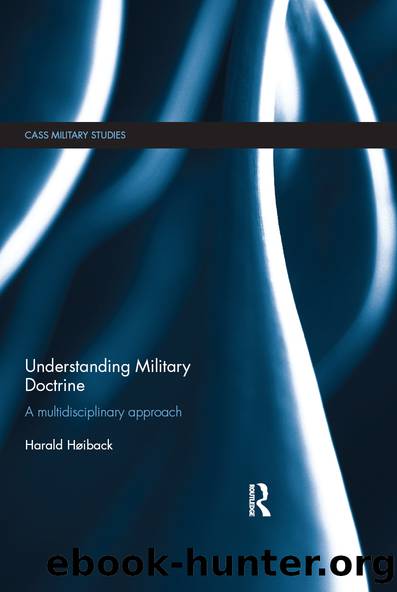Understanding Military Doctrine by Hoiback Harald;

Author:Hoiback, Harald;
Language: eng
Format: epub
ISBN: 1170341
Publisher: Taylor & Francis Group
Part III
Why doctrine?
8 The utility of doctrine
In the previous parts of this book, we have investigated the nature of doctrines and, particularly, the props and justifications you can expect to find in them. In this part, we will round it all off by trying to justify the need to have doctrines at all.
The arch-question in the philosophy of military doctrine making is whether doctrineâs upside compensates for its downside. This predicament is captured by a strict formula (that is probably etched, in one form or another, in every military doctrine in the world), which says that doctrine is âauthoritative but requires judgment in applicationâ.1 For the individual decision maker, however, the message sounds suspiciously like a catch-22, a cyclical conundrum, where youâre damned if you do, and damned if you donât.2
Evidently, given the plethora of doctrines in the Western world, doctrinal quandaries have not put states off at least trying to develop feasible doctrines, in one way or another. Why? There are several plausible explanations:
⢠The conventional explanation: war making is complicated and in order to succeed we ought to think systematically through and deliberately perpetuate the beliefs we have about what works in war.
⢠The institutional explanation: others have one; hence, we ought to have one as well.
⢠The sociological explanation: doctrines legitimise the âauthority, power and privilege of elitesâ.3
⢠The strategic-advantage explanation: doctrine is âan intangible asset that must be cultivated in order to gain a rare and valuable source of competitive advantageâ.4
The first bullet point is presumably the least controversial, but the second is perhaps closer to reality, especially for smaller countries that fight their wars in coalition with big partners, and for the individual services in their battle for funding and political support. For a minor coalition partner, the choice can, in reality, be whether to produce a make-believe doctrine, or to go without it entirely; overtly or covertly resting on the coalition or allianceâs doctrines. To Frederick the Great and Moltke, on the other hand, it is presumably the fourth point that best explains their intentions, while, for the French after 1870, their work must also be seen in the light of the third bullet point.
While recognising that in real life all four explanations must be given their due, this study will argue that the seriousness of war, nonetheless, warrants a systematic contemplation of its means as well as its ends; and if done properly, doctrine can turn out to be a âvaluable source of competitive advantageâ. In the first chapter of this study, we presented a number of arguments against doctrine; in the following, we will give a number of arguments in support of it, and conclude that the weighing up of doctrineâs pros and cons ends up in favour of having it, notwithstanding all its shortcomings.5
The list of objections to doctrine presented in the introduction to this study implies, in a nutshell, that the attempt to crystallise âthe spirit of warâ into a written doctrine can cause the death of that spirit and
Download
This site does not store any files on its server. We only index and link to content provided by other sites. Please contact the content providers to delete copyright contents if any and email us, we'll remove relevant links or contents immediately.
The Radium Girls by Kate Moore(11644)
100 Deadly Skills by Clint Emerson(4705)
The Templars by Dan Jones(4562)
Rise and Kill First by Ronen Bergman(4555)
The Doomsday Machine by Daniel Ellsberg(4255)
The Rape of Nanking by Iris Chang(4029)
Killing England by Bill O'Reilly(3901)
Hitler in Los Angeles by Steven J. Ross(3805)
Stalin by Stephen Kotkin(3732)
12 Strong by Doug Stanton(3424)
Hitler's Monsters by Eric Kurlander(3176)
Blood and Sand by Alex Von Tunzelmann(3067)
Darkest Hour by Anthony McCarten(3019)
The Code Book by Simon Singh(2878)
The Art of War Visualized by Jessica Hagy(2846)
Hitler's Flying Saucers: A Guide to German Flying Discs of the Second World War by Stevens Henry(2631)
Babylon's Ark by Lawrence Anthony(2439)
The Second World Wars by Victor Davis Hanson(2425)
Tobruk by Peter Fitzsimons(2381)
